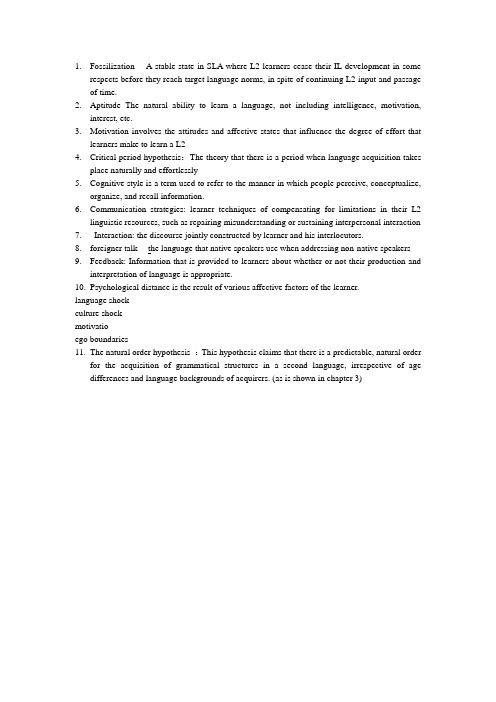Motivation Cognitive style
- 格式:ppt
- 大小:65.50 KB
- 文档页数:10

一、Key issues in second language acquisition(二语习得的关键问题)调查SLA的框架:(1)situational factors(形势)(2)Input(输入)(3)Learner differences(学习者差异)(4)Learner processes(学习过程)(5)Linguistics output(语言输出)1.situational factors(形势)Linguistic environment:situational factors & Input根据语言环境的不同,两种类型的习得:(1)naturalistic SLA(自然二语习得)(2)Classroom SLA(课堂二语习得)2.linguistic input(语言输入)中心问题是:语言输入在多大的程度上决定了SLA的过程,是仅仅激发了学习过程,还是机构化SLA?本地话语者是其话语水平适应L2学习者,另一个问题是:这些话语调整在促进学习中起到什么作用。
3.learner differences(学习者差异)潜在影响因素:年龄,个人能力水平(aptitude)和智力(intelligence),动机(motivation)和需求(needs),个性(personality)和认知方式(cognitive style)另一种差异:学习者的L1,要保证对比分析假说(contrastive analysis hypothesis)服从实验测试(empirical test)4.Learner processes(学习过程)学习过程包含认知学习过程(cognitive Learner processes)和语言学习过程(linguistic Learner processes)认知学习过程分为三个范畴:(1)学习战略(learning strategies):内化新的L2知识(2)产生战略(production strategies):学习者利用其现存的L2知识的方式(3)交流战略(communication strategies):用于当学习者缺乏L2资源导致交流受阻时用的战略。

Good habits are the cornerstone of a persons character and success in life.They not only shape our daily routines but also influence our longterm achievements and wellbeing. Heres a detailed look at how good habits can lead to the formation of a wellrounded individual.Importance of Good Habits1.Health Benefits:Regular exercise,a balanced diet,and adequate sleep are good habits that contribute to physical health.They help in maintaining a healthy weight,boosting immunity,and ensuring a good nights rest,which is essential for overall health.2.Mental Wellbeing:Habits like meditation,reading,and continuous learning contribute to mental wellbeing.They help in reducing stress,improving focus,and expanding knowledge,which are crucial for cognitive development.3.Time Management:Good habits such as punctuality and planning help in effective time management.They ensure that tasks are completed on time,reducing the stress associated with lastminute rushes and missed deadlines.4.Financial Stability:Habits like saving money,budgeting,and investing wisely contribute to financial stability.They help in building an emergency fund,achieving financial goals,and securing a comfortable future.5.Social Skills:Good habits like active listening,empathy,and effective communication enhance social skills.They foster better relationships,improve teamwork,and contribute to a positive social environment.Formation of Good Habits1.Awareness:The first step in forming a good habit is being aware of its importance. Understanding the benefits of a habit can motivate one to adopt it.2.Consistency:Consistency is key to forming a habit.It requires daily practice and commitment to the habit until it becomes a natural part of ones routine.3.Small Steps:Starting with small,manageable steps can make the process of habit formation less daunting.For example,starting with a10minute exercise routine can lead to longer and more intense workouts over time.4.Environment:Creating a conducive environment can support the formation of goodhabits.For instance,keeping a workspace organized can encourage productivity.5.Accountability:Having a support system or using tools like habit trackers can provide accountability,which is essential for maintaining new habits.Challenges and Solutionsck of Motivation:Sometimes,the lack of immediate results can demotivate individuals.Setting shortterm goals and celebrating small victories can help maintain motivation.2.Procrastination:Procrastination can hinder the formation of good ing techniques like the Pomodoro Technique or breaking tasks into smaller parts can help overcome procrastination.3.Distractions:Distractions can divert attention from the habit formation process. Identifying and eliminating common distractions can create a more focused environment.ck of Time:Many people feel they lack the time to form new habits.Prioritizing and integrating new habits into existing routines can help find the time for habit formation.ConclusionGood habits are the building blocks of a successful and fulfilling life.They require awareness,consistency,and a supportive environment to be formed.Overcoming challenges like lack of motivation,procrastination,and distractions can be achieved through various strategies.Ultimately,the formation of good habits leads to personal growth,improved health,and a more productive lifestyle.。



1.Fossilization ---A stable state in SLA where L2 learners cease their IL development in somerespects before they reach target language norms, in spite of continuing L2 input and passage of time.2.Aptitude The natural ability to learn a language, not including intelligence, motivation,interest, etc.3.Motivation involves the attitudes and affective states that influence the degree of effort thatlearners make to learn a L24.Critical period hypothesis:The theory that there is a period when language acquisition takesplace naturally and effortlessly5.Cognitive style is a term used to refer to the manner in which people perceive, conceptualize,organize, and recall information.munication strategies: learner techniques of compensating for limitations in their L2linguistic resources, such as repairing misunderstanding or sustaining interpersonal interaction7.Interaction: the discourse jointly constructed by learner and his interlocutors.8.foreigner talk--- the language that native speakers use when addressing non-native speakers9.Feedback: Information that is provided to learners about whether or not their production andinterpretation of language is appropriate.10.Psychological distance is the result of various affective factors of the learner.language shockculture shockmotivatioego boundaries11.The natural order hypothesis :This hypothesis claims that there is a predictable, natural orderfor the acquisition of grammatical structures in a second language, irrespective of age differences and language backgrounds of acquirers. (as is shown in chapter 3)。

对四种学习动机理论的评析学习动机理论是心理学分支教育心理学领域中最重要的理论之一,它关乎学习能力的发展和发挥作用,对学习质量和学习成果也具有重要意义。
学习动机理论可以大致分为四种:社会学习理论、情绪性学习理论、行为动机理论和认知动机理论。
社会学习理论(Social Learning Theory)的基本观点是,人是一个被社会环境影响的有机整体,他的行为是受外界刺激和社会环境影响而发展的。
荣格认为,行为是对社会环境的反映,人性深处存在着一种认知与行为相结合的学习,也就是所谓的“学习态度”,这就是“社会学习”的概念。
情绪性学习理论(Affective Learning Theory)的基本观点是以情感为基础的学习,这种学习与认知无关,而是以感情或态度为基础的学习。
情绪性学习主要是对学习情境的一种感受,这种感受会影响学习的动机,促进学习的持久性和激励性。
情绪性学习主要是以积极的情感来激励学习,可以激发学习者的积极性和学习兴趣,也可以帮助学习者建立正确的学习态度。
行为动机理论(Behavioral Motivation Theory)的基本观点是按照建立了特定奖励与处罚机制的要求,通过对学习者进行激励和制约来调节学习行为,通过反复操练、报酬或惩罚等方式,使其形成良好的学习习惯,从而达到学习的目的。
这一理论认为,通过反复的正面和负面的奖励刺激,可以调节和控制学习者的行为,从而提高学习的效率。
它基于对人的行为本质的分析,以得到回报的可能性来引导和影响学习者的行为。
认知动机理论(Cognitive Motivation Theory)更加重视学习者主观意义上的情感、态度和需求,它强调学习者主观意识认识活动中所包括的学习动机,重点在于探讨学习者不同阶段的心理行为,以及学习者在同一阶段中对学习的态度和需求。
它特别重视学习者的心理行为的本质,倾向于从学习者的内心出发,研究学习者内心与外部环境的相互影响,从而达到因材施教的效果。
高职学生英语习得个人影响因素分析及解决策略【摘要】高职院校学生在学习英语方面受到多种因素的影响,本文通过二语习得理论中个人影响因素理论,分析高职学生在学习英语过程中如何受到个人影响因素的影响,并提出如何能够引导高职学生更好的学习英语。
【关键词】高职学生;英语习得;个人因素;解决策略随着我国同其他国家的经济交流不断的加强,越来越多的岗位需要大批毕业于高职院校的应用型技能人才,特别是具有较好英语功底的技术性人才。
由此可见英语教学在高职课程中的重要作用。
目前高职院校各专业的英语课程所占比例约为10%,各专业在教材的选择上也各有不同,但是大量学生对英语的学习热情不高,认为学英语就是为了考试,他们还认为学习英语和他们以后工作没有关系,因此除了少数对英语感兴趣的同学,大部分对英语学习的兴趣都不高,导致了高职英语教学的困难。
本文从二语习得理论中的个人因素对高职学生英语学习的影响进行分析,并提出如何能够更好的帮助高职学生习得英语的方法。
一、高职学生英语习得个人影响因素分析rod ellis在《第二语言习得概论》中提到二语学习中的个人影响因素分两类:自身因素和普通因素。
自身因素包括动态群体因素、态度因素和个人学习技能因素。
普通因素包括年龄因素、智力因素、认知因素、动机因素和个性因素。
本文将具体分析高职学生在英语习得过程中如何受到个人影响因素的影响。
(一)自身因素1.动态群体因素group dynamicsbailey(1983)认为许多语言学习者中竞争和焦虑对他们产生很大影响。
一些课堂学习者会将自己和班级同学进行比较,同时他们也会对自己所努力的进程与预期效果进行比较。
bailey(1983)也提出学习者会将自我形象与其他学习者形象比较,要么增强要么会削弱二语习得的作用。
高职院校学生的英语水平参差不齐,在学习过程中,英语基础好的同学会在竞争中处于优势,这样他们的焦虑感就会减小,他们会更努力使得自我形象趋于成功,因此他们会更好的学习英语。
简要讨论影响第二语言的个体因素英语作文introductionSince the 1950s, the role of learners' individual differences in second language acquisition has been widely concerned about the outline of graduation thesis, and the study of learners' individual differences has also become one of the main lines of second language acquisition research. According to the consensus of many scholars, these individual differences include the following aspects: 1) views and views on how to learn a foreign language; 2) Mental and psychological state; 3) Age factor; 4) Learning motivation; 5) Language ability tendency; 6) Cognitive style 7) personality factors. This paper mainly discusses the influence of the last four individual differences on second language acquisition.The influence of motivational factors on second language acquisitionMotivation refers to those thoughts, desires, ideals and other factors that can arouse and maintain a person's activities and guide the activities to a certain goal to meet an individual's needs. It canbe divided into the following types:1. Intrinsic motivation refers to the satisfaction that foreign language learners get from learning itself. Maintaining a harmonious relationship between teachers and students is the key to maintaining students' interests.2. The outline of the graduation thesis of result motivation refers to the satisfaction that foreign language learners obtain due to their good academic performance and sense of achievement. Motivation and academic performance complement each other.3. Comprehensive motivation refers to the fact that foreign language learners have a strong interest in the native language and its culture, so as to achieve the purpose of communicating with them and even integrating into the social culture.4. Instrumental motivation the graduation thesis outline is the condition that foreign language learners are not interested in the foreign language itself or anxious with native speakers. Learning foreign language knowledge as a means or tool to achieve other purposes, such as finding a job, reading the original newspaper or passing the exam, and so on. Such motivation becomes instrumentalmotivation.The influence of language learning ability on second language acquisitionLanguage ability tendency refers to a natural language learning ability possessed by foreign language learners, that is, it is a potential ability that may be developed. It is generally believed that the tendency of language ability is mainly reflected in four aspects.1. Language decoding ability, that is, the ability to distinguish and memorize foreign language phonemes.2. Grammatical decoding ability, also known as grammatical sensitivity by some scholars, mainly refers to learners' ability to distinguish the grammatical functions of each word in a sentence.3. Inductive learning ability refers to the ability of foreign language learners to identify the corresponding relationship between language form and meaning.4. The graduation thesis outline of mechanical learning ability generally refers to the study that lacks practice materials or the meaning connection of materials, that is, the study that is usually said to be simple repetition and rote learning.The influence of cognitive style on second language acquisition Cognitive style. It refers to the persistent and consistent unique style of individuals in the process of information processing in terms of human organization and cognitive function. Individual branching style is mainly manifested in the following aspects: field dependence and field independence; Analytical and non analytical conceptualization tendency; The choice of the width of cognitive field; Complex cognition and simple cognition; Adventure and conservatism.People who think that they belong to a continuum often share and make more use of internal reference signs to actively process external information throughout the year. This kind of people is called field independent people; People on the other side tend to make more use of external reference marks and less actively process graduation thesis outlines with external information. This kind of people are called field dependent people who download free papers. There is no consensus on the merits of the two cognitive styles in foreign language learning.The influence of personality factors on second languageacquisitionAmong personality factors, such as self-esteem, inhibition, anxiety, adventurous spirit and internal and external tendencies will have a certain impact on second language acquisition, which will make differences in learning speed and final foreign language level.epilogueIn the process of second language acquisition, individual differences have a great impact on learners' second language families. However, as far as the current research results are concerned, we still cannot explain which individual differences play a crucial role in the success of second language acquisition. In addition, we should also recognize that in addition to individual differences, society, foreign language acquisition mechanism, cultural background, learning atmosphere and environment also have a great impact on learners' second language acquisition. The individual difference factors we studied are only the influence。